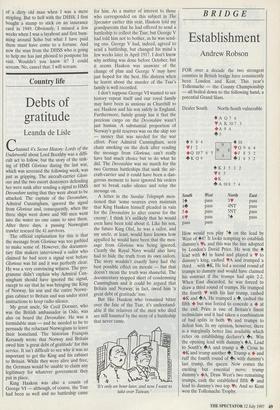Country life
Debts of gratitude
Leanda de Lisle
The official explanation for this is that the message from Glorious was too garbled to make sense of. However, the documen- tary film makers interviewed a sailor who claimed he had seen a signal sent before Glorious was hit and it was perfectly clear. He was a very convincing witness. The pro- gramme didn't explain why Admiral Cun- ningham should have ignored the signal, except to say that he was bringing the King of Norway, his son and the entire Norwe- gian cabinet to Britain and was under strict instructions to keep radio silence. My great uncle, Sir Cecil Dormer, who was the British ambassador in Oslo, was also on board the Devonshire. He was a formidable man — and he needed to be to persuade the reluctant Norwegians to leave their homeland. The historian Francois Kersaudy wrote that Norway and Britain owed him 'a great debt of gratitude' for this service. It isn't difficult to see why it was so important to get the King and his cabinet to Britain. While they were alive and free, the Germans would be unable to claim any legitimacy for whatever government they put in place. King Haakon was also a cousin of George VI — although, of course, the Tsar had been as well and no battleship came for him. As a matter of interest to those who corresponded on this subject in The Spectator earlier this year, Haakon told my grandparents that he had offered to send a battleship to collect the Tsar, but George V had told him not to bother, as he was send- ing one. George V had, indeed, agreed to send a battleship, but changed his mind a few weeks later in April 1917. I don't know why nothing was done before October, but it seems Haakon was unaware of the change of plan and George V may have just hoped for the best. His distress when he learnt about the murder of the Tsar's family is well recorded.
I don't suppose George VI wanted to see history repeat itself and our royal family may have been as anxious as Churchill to see Haakon and his son safely in England. Furthermore, family gossip has it that the precious cargo on the Devonshire wasn't just human. A substantial proportion of Norway's gold reserves was on the ship too — money that was needed for the war effort. Poor Admiral Cunningham, seen chain smoking on the deck after reading the message from Glorious, can't really have had much choice but to do what he did. The Devonshire was no match for the two German battleships that sank the air- craft-carrier and it could have been a dan- gerous moment to have ignored his orders not to break radio silence and relay the message on.
A letter in the Sunday Telegraph men- tioned that 'some sources even maintain that King Haakon himself pleaded in vain for the Devonshire to alter course for the enemy'. I think it's unlikely that he would even have been told about it. Like his son, the future King Olaf, he was a sailor, and my uncle, at least, would have known how appalled he would have been that the mes- sage from Glorious was being ignored. Clearly the Royal Navy would also have had to hide the truth from its own sailors. The story wouldn't exactly have had the best possible effect on morale — but that doesn't mean the truth was shameful. The documentary stopped short of condemning Cunningham and it could be argued that Britain and Norway, in fact, owed him 'a great debt of gratitude' too.
But like Haakon who remained bitter over the fate of the Tsar, it's understand- able if the relatives of the men who died are still haunted by the story of a battleship that never came.
It's only an hour later, and now I want to take over Taiwan.'


























































 Previous page
Previous page